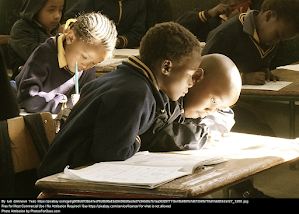You've probably heard the old statement teachers sometimes use: "remember, I have eyes in the back of my head". This is mainly used to class control and to modify behaviour. I can recall teachers who would say, "I'm watching you Cairney". Did this change my behaviour? A little. But more importantly, did it change my attitudes, hopes, priorities, beliefs and so on? No! While teachers are generally good at spotting children who are misbehaving, or pushing the limits of their patience, I think there is a far more important skill for effective teaching. Are we good at seeing that which isn't simply visible? By this, I mean observing classroom behaviour, and grasping what this might reflect. It's easy to see a child who misbehaves, or acts appropriately. But do we see beyond the demonstrated behavior to their motivations and beliefs that lead them to the action, make bad choices and so on? We need to sharpen our human imagination and develop our "social imaginary".
In 'Pedagogy and
Education for Life' I cite Charles Taylor's work that is helpful in
addressing the above. Taylor suggests that to understand culture, we need
to stop assuming only ideas move people. James Smith also takes up Taylor's
call to look more deeply at why children do the things they do. Taylor
challenges teachers to get beyond the surface rhetoric, and the priorities
teachers and schools express. Why? Because they are simply the intellectual
arguments or priorities of an institution. Beyond the surface level rhetoric,
we need to consider how the priorities of the school and teacher are received
and taken on. How do our students reconcile the priorities, stories, myths,
images, iconic hopes and dreams of the school, with their present and past
experiences? How do they connect these? Taylor suggests all groups and
individuals are motivated by a “social imaginary” which helps them to imagine
the context of their lives and their hoped for future. What do I mean by this?
The relationship between students and teachers, and students and institutions is complex. Classroom life is not just about the things we do or say to one another. Russian psychologist Lev Vygotsky argued that there is a dialectical relationship between teaching and learning. He used the concept of Obuchenie to explain such relationships. Teaching and learning are intertwined, and how students receive that which is taught, and how this does or doesn't shape or transform them, is not straight forward.
For true transformation to occur in students, that is, that which is beyond mere compliance and appropriate behaviour, teachers and students need to adapt to one another. This in essence is what the word "Obuchenie" seeks to represent. That is, a change in the relationship between teacher and child. As I write in my book:
"...Such change requires a shift of pedagogical focus from simply transmitting knowledge or practices for students to replicate, to the creation of classrooms where students have the opportunity to see connection between the varied communities of practice they navigate each day as part of normal life. These are classrooms where teachers guide, nudge, respond, question, listen, observe, urge, teach, and reveal truth in ways students can connect to their lived experiences."
The next time you observe another teacher, try to contrast the messages of the school with that of the world, and the extent to which your students comply with and more importantly, accept these as part of their life. Furthermore, consider how these are different to, or simply the same as those projected by the world. If there is little difference, then "Houston, we have a problem"!
For further thoughts on this topic you might like to read chapter 6 of "Pedagogy and Education for Life" that is titled 'Classroom Life'.


